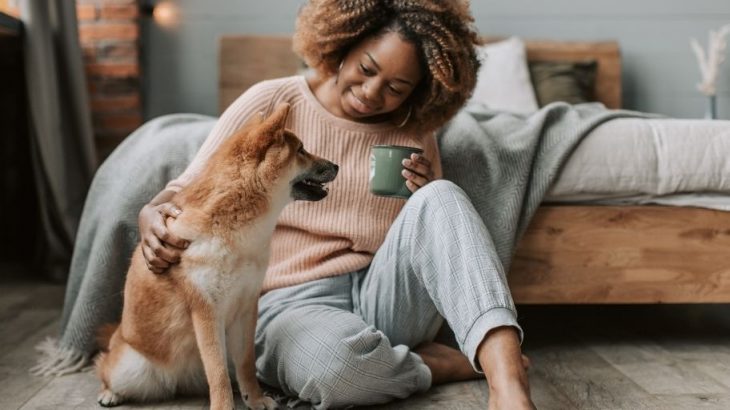Adopting a Pet in Recovery: Be Realistic About the Responsibility

Rescuing my dog was a pivotal moment in my recovery from alcohol and mental health issues. Not only did I become a parent overnight (no joke with my demanding puppy), but I also experienced the most amount of joy I had in quite a long time.
This little bundle of fluff gave me a sense of companionship and a kind of love that I’d never experienced before. And my recovery has really benefited from our relationship.
I could not imagine my life without Bowie. That said, in sharing my story of adopting a pup, I want to be realistic about what an undertaking it was. It isn’t for the faint of heart – maybe you might relate (or even benefit) from knowing this information before adopting your own pet in recovery.
Planning to Adopt a Pet in Recovery
 I have to admit my approach to getting a dog wasn’t the healthiest. Actually, I should give myself a little more credit. At the very least, I ensured that I was financially stable enough to take care of my pup, I set my sights on the right age, breed, and temperament of dog, I researched insurance options, and I had a big enough studio apartment that allowed me to have a dog.
I have to admit my approach to getting a dog wasn’t the healthiest. Actually, I should give myself a little more credit. At the very least, I ensured that I was financially stable enough to take care of my pup, I set my sights on the right age, breed, and temperament of dog, I researched insurance options, and I had a big enough studio apartment that allowed me to have a dog.
But back to the unhealthy part of the decision to rescue a pet in recovery…
While I’d been considering the right time to get a dog, I actually went to the Humane Society on a whim. It was a little reactionary. Here’s why: I’d been at the dentist that morning and had a terrible experience. I was in recovery from years of abusing alcohol and torturing my liver. I’d recently overcome an addiction to sleeping pills (and still struggling to get a decent night’s sleep). I was in a toxic relationship that I desperately needed to end. So I called a friend and asked her to take me to the Oregon Humane Society.
My friend obliged, but was concerned that I seemed a little insistent on my goal of coming home with a dog the same day. We went inside and I was overwhelmed with the noise as we walked into the kennel.
The volunteer explained there were over 50 dogs in their care at the time. It broke my heart to see all of them without a loving home. On reflection, it’s pretty clear I was acting from a place of emotion rather than rational thinking!
Ignoring My Sensible Plan to Adopt a Pet in Recovery
As soon as I stepped inside, Cinder (who I renamed Bowie) was the first puppy I saw. She was sitting there on a bed in her little rectangle of a home. She had the biggest eyes and the cutest lab puppy look going on. I was smitten immediately.
“She’s the one,” I exclaimed to my friend.
My friend reminded me that I had planned on getting a two to four year-old dog without too many behavioral problems…yet here I was looking at a 6-month old puppy and determined to take her home that day. My friend insisted that we walk around the rest of the kennel to ensure that there were no other dogs (that might be better suited, she was thinking).
I obliged, but I’d already made up my mind. By the time we reached the end of the kennels, I told the volunteer that Bowie was the one.
What happened next was another warning sign that I ignored.
The volunteers and trainers took me into a room with Bowie so I could meet her. I thought she was beautiful and cute and all the lovely things you see with rose-tinted glasses. Except the behaviorists told me for 30 minutes what a handful this girl would be:
- She wouldn’t be able to go to the dog park because they don’t know if she is a good fit with other dogs.
- She was very hyperactive (she even did zoomies around the room while we were talking).
- She had already been returned three times for escaping (and putting a cat in her mouth).
They were concerned that Bowie might be too much for me. Obviously, I ignored these concerns, dismissing them as exaggerated. I took her home thinking that a puppy would take my focus away from the toxic relationship I was trying to escape.
And, oh boy, she certainly did that!
Real Life With a Dog…in Recovery
The shelter workers were right; Bowie was a handful!
She had a lot of energy and severe separation anxiety. When left alone she would shred pillows, blankets, and escape from her crate injuring herself in the process. I spent hundreds of dollars on training and vets trying to find the right support for her.
While my love for her and commitment to her never waivered, I have to admit it was a pretty dysregulating experience. I felt stressed. I was anxious about leaving, and concerned that I’d never be able to leave her alone. I also spent a lot of time exhausting her — and myself in the process — to create more calm for her.
A lot of those things worked, but the challenges of adopting a pet in recovery didn’t really stop until she was around two or three years old. In the meantime, she got poisoned, attacked by another dog, and developed leash aggression.
Moving into a home with a yard was a really great move for us, but not everyone has that option. I was lucky enough to be able to do that and Bowie really calmed down. She stopped destroying things when I left and was much happier and chill.
I often wonder how I would’ve managed this if I had not been over five years in recovery. Frankly, I don’t think I could’ve. And for that I’m really grateful.
Despite these challenges, I do need to underline that the joy and benefits of adopting a pet in recovery have far outweighed our struggles:
- I’ve had a solid sense of companionship, and I have never felt alone since rescuing her.
- She mirrors my emotional state. If I’m anxious, so is she. So she serves as a visual reminder that I’m feeling anxious and would benefit from changing that.
- She gave me a sense of protection when I lived alone. Bowie has some kind of shepherd in her makeup, so she’s very protective and always on the lookout for something that could endanger us. I feel a lot more safe and secure in her presence.
- Bowie brings so much joy as she runs around the dog parks, does zoomies with sticks in her mouth around the woods, and loves to play with her brother at the beach. Seeing her happiness always brings a huge smile to my face.
Facts About Animals and Mental Health
 It’s no surprise to me that dogs, and animals in general, have been scientifically proven to improve mental health and boost one’s recovery.
It’s no surprise to me that dogs, and animals in general, have been scientifically proven to improve mental health and boost one’s recovery.
Some of those benefits include:
- Dogs can alleviate symptoms of PTSD
- Pets can help provide emotional regulation, helping their owners to reduce feelings of stress, overwhelm and anxiety
- The responsibility of an animal to take care of can prevent relapse
- Animals can reduce depression in their owners
- Dogs can improve psychological well-being and even resilience
- Pets can improve physical activity, getting you out of the house to walk several times a day
- People who struggle with ADHD and autism greatly benefit from the emotional regulation of dogs, and the structure they provide
- Animals can increase self-confidence because they show unconditional love to their owners
- Pets can also help you meet other people, in dog parks, or on hikes, which are the kinds of people that improve your health like sustaining recovery.
How to Choose the Right Pet in Recovery
I hope that, by sharing my story, you can see where I may have overcommitted myself. I definitely could have benefited from sticking to my plan.
If I were to make recommendations for adopting a pet in recovery, based on my experience, here’s what I’d encourage you to consider:
- How much space do you have: is your home big enough for a large animal? Where will their crate and dog bed go? Do they have access to an outdoor space?
- There are costs associated with owning a pet. Do you have savings? Can you afford pet insurance, food, and medication that the dog might need?
- How active are you? And are you are physically active enough to walk several miles a day?
- What is your schedule like? Do you work from home? How would you cope if the dog has separation anxiety? Can you afford a dog-walking service if you’re away for more than five hours at a time.
- Do you have support? If you are single and live alone, consider who you can call on for help. This is especially important if you have a job that requires you to take regular trips and leave home for long periods of time.
- What is the kind of temperament you’d like in a dog? Do you want them to be a lapdog, or a dog that needs long walks? Be sure to research the breed of pup you are considering and if possible get the advice of a behavioral expert. That’s what’s great about adoption places like the Humane Society, as they have assessed the dogs and, like in my case, can make recommendations so the dog is a good fit for your circumstances.
- Keep your list in mind when attending a shelter to meet possible pets to adopt.


